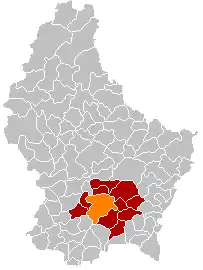Luxembourg Republic
The Luxembourg Republic also known as the Republic of Luxembourg was a short lived communist state that came into being after the Luxembourg Rebellion. The state fell after it was invaded by France just days after it founding.[1]
Luxembourg Republic | |||||||||
|---|---|---|---|---|---|---|---|---|---|
| 1919 | |||||||||
 Flag | |||||||||
 | |||||||||
| Capital | Luxembourg City | ||||||||
| Government | Luxembourg Comité de Salut Public | ||||||||
• | Émile Servais | ||||||||
• | 1919 | ||||||||
| |||||||||
History
On 9 January 1919, a group of socialist and liberal Deputies publicly proclaimed a republic in Luxembourg after losing a vote in parliament to abolish the monarchy. A crowd gathered outside the capitol in Luxembourg City and eventually charged at the guards outside the building. The Luxembourg Army was called, with about 200 soldiers in two companies responding to the unrest.[2] Unable to defend from the crowd, one company refused orders then joined the rebellion, while the other company of police officers stayed loyal. The Army occupied the capitol and proclaimed the "Republic of Luxembourg", causing the Luxembourg government to evacuate and appeal to France for assistance. Well-equipped and well-trained forces from the French Army under the command of General de La Tour soon entered Luxembourg City and engaged in a battle for the capitol. The rebellion was short-lived as the Luxembourgish revolutionaries were quickly defeated, retreating and falling into chaos.[3]
Government
The Luxembourg Republic was led by the 8 person Comité de Salut Public led by Émile Servais.
Military
The Luxembourg Republic had a small army only consisting of the one revolting company known as the Luxembourg Corps of Volunteers, while the second company the Luxembourg Corps of Gendarmes, remained loyal to the royalist government.
References
- "Luxembourg's history : Mutiny in the Grand Duchy". today.rtl.lu. Retrieved 2023-09-01.
- NATO. "Luxembourg and NATO - 1949". NATO. Retrieved 2023-09-01.
- "The history of Luxembourg and its dynasties | Cour grand-ducale". www.monarchie.lu. Retrieved 2023-09-01.